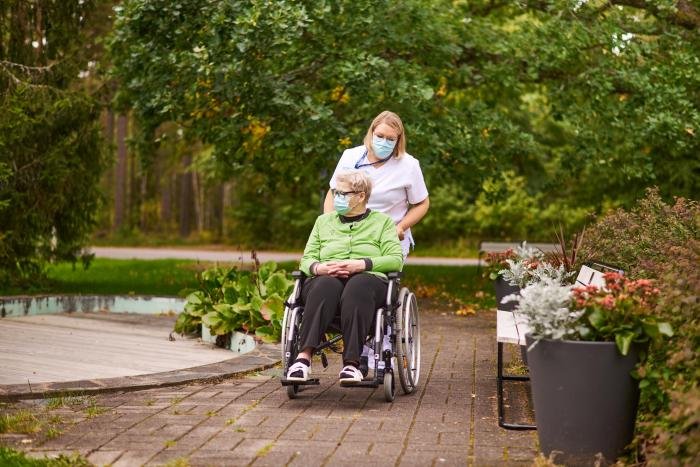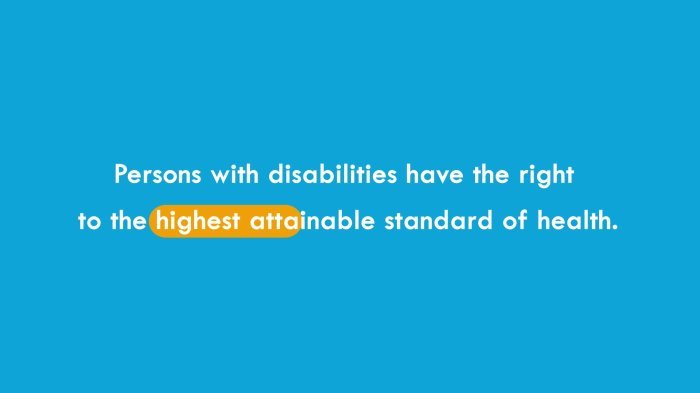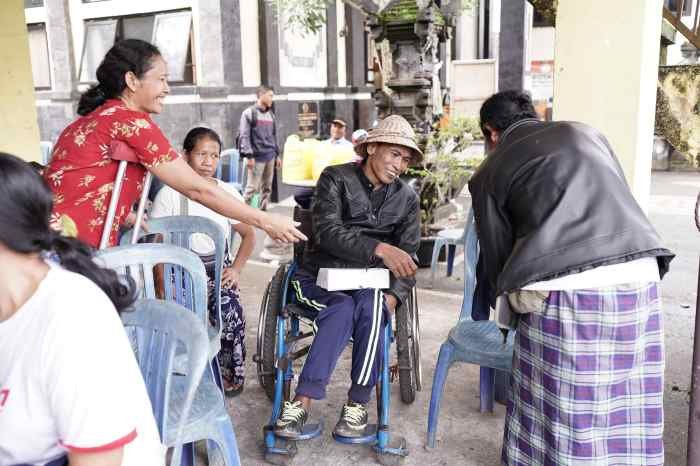Ability health services are revolutionizing how we approach healthcare, focusing on empowering individuals with disabilities to lead fulfilling lives. Unlike traditional healthcare, which often centers around treating illness, ability health services prioritize maximizing potential and promoting independence.
This field encompasses a wide range of services, including assistive technology, rehabilitation therapies, and adaptive programs, all designed to address the unique needs of individuals with disabilities. From specialized equipment that enables mobility to therapies that enhance cognitive function, ability health services are transforming lives and creating a more inclusive society.
Definition and Scope of Ability Health Services

Ability health services encompass a comprehensive approach to healthcare that focuses on empowering individuals with disabilities to achieve optimal well-being and participate fully in society. Unlike traditional healthcare, which often treats illness and injury, ability health services prioritize the promotion of independence, self-management, and inclusion.Ability health services encompass a wide range of interventions and support systems designed to address the unique needs of individuals with disabilities.
These services aim to enhance functional abilities, promote accessibility, and foster social participation.
Assistive Technology
Assistive technology plays a pivotal role in ability health services by providing individuals with disabilities with tools and devices that enhance their independence and quality of life. These technologies can range from simple adaptive aids, such as grab bars and ramps, to sophisticated electronic devices, such as communication aids and mobility aids.Assistive technology can be categorized into various types, including:
- Communication aids:Augmentative and alternative communication (AAC) devices, such as speech-generating devices, communication boards, and eye-tracking systems, enable individuals with communication impairments to express themselves effectively.
- Mobility aids:Wheelchairs, walkers, canes, and scooters provide individuals with mobility impairments the ability to move independently and participate in daily activities.
- Sensory aids:Hearing aids, cochlear implants, and visual aids, such as magnifiers and braille displays, assist individuals with sensory impairments in accessing and interpreting information.
- Computer access aids:Screen readers, voice recognition software, and adaptive keyboards facilitate computer access for individuals with visual or motor impairments.
Rehabilitation Services
Rehabilitation services are an integral part of ability health, focusing on restoring and maximizing functional abilities following an injury, illness, or disability. These services aim to help individuals regain lost skills, adapt to new challenges, and achieve their full potential.Rehabilitation services can include:
- Physical therapy:Physical therapists work with individuals to improve their strength, flexibility, balance, and coordination.
- Occupational therapy:Occupational therapists assist individuals in developing skills for daily living, such as dressing, bathing, and cooking.
- Speech-language therapy:Speech-language pathologists help individuals with communication impairments, including speech, language, and swallowing difficulties.
- Cognitive rehabilitation:Cognitive therapists provide support and strategies for individuals with cognitive impairments, such as memory problems, attention deficits, and executive functioning challenges.
Adaptive Therapies
Adaptive therapies are specialized interventions that address the unique needs of individuals with disabilities, promoting their well-being and enhancing their quality of life. These therapies go beyond traditional rehabilitation approaches, focusing on holistic care and personalized support.Adaptive therapies can include:
- Therapeutic horseback riding:Equine-assisted therapy utilizes the movement and interaction with horses to improve physical, cognitive, and emotional well-being.
- Animal-assisted therapy:The presence and interaction with animals, such as dogs and cats, can provide therapeutic benefits, promoting relaxation, reducing anxiety, and enhancing social interaction.
- Art therapy:Art therapy uses creative expression through art to facilitate emotional processing, communication, and self-awareness.
- Music therapy:Music therapy uses music to address a range of needs, including cognitive, emotional, and physical challenges.
Organizations and Institutions
Numerous organizations and institutions specialize in providing ability health services, offering a wide range of programs and resources to support individuals with disabilities and their families.Examples of such organizations and institutions include:
- The National Institute on Disability, Independent Living, and Rehabilitation Research (NIDILRR):A federal agency that funds research and provides resources to improve the lives of people with disabilities.
- The Rehabilitation Services Administration (RSA):A federal agency that provides financial assistance to states for vocational rehabilitation services.
- The United States Department of Veterans Affairs (VA):Offers a comprehensive range of rehabilitation services to veterans with disabilities.
- The American Association of People with Disabilities (AAPD):A national advocacy organization that promotes the rights and opportunities of people with disabilities.
- The National Council on Disability (NCD):An independent federal agency that advises the President and Congress on disability policy.
Importance of Ability Health Services

Ability health services play a crucial role in empowering individuals with disabilities to live fulfilling and independent lives. These services address the unique needs and challenges faced by people with disabilities, promoting their physical, cognitive, and emotional well-being while fostering inclusion and accessibility in society.
Impact on Physical, Cognitive, and Emotional Well-being
Ability health services directly impact the physical, cognitive, and emotional well-being of individuals with disabilities. They provide essential support and interventions that enhance their overall health and quality of life.
- Physical Well-being:Ability health services encompass a range of therapies and interventions that promote physical health and independence. These services include physical therapy, occupational therapy, and assistive technology, which help individuals with disabilities manage their physical limitations, improve mobility, and engage in daily activities.
For instance, physical therapy can help individuals with spinal cord injuries regain mobility and strength, while occupational therapy can assist individuals with cognitive impairments in performing daily tasks such as dressing and cooking.
- Cognitive Well-being:Cognitive health is another crucial aspect addressed by ability health services. These services provide cognitive rehabilitation, counseling, and support groups to individuals with cognitive impairments, helping them develop strategies for managing their conditions and improving their cognitive function. Cognitive rehabilitation can help individuals with brain injuries improve their memory, attention, and problem-solving skills.
Counseling can provide emotional support and coping mechanisms for individuals with cognitive disabilities and their families.
- Emotional Well-being:Ability health services also prioritize the emotional well-being of individuals with disabilities. They offer counseling, support groups, and social activities that help individuals cope with the challenges of living with a disability, build self-esteem, and connect with others. These services can be particularly helpful for individuals with mental health conditions, who may face additional challenges related to their disability.
Promoting Inclusion and Accessibility
Ability health services are instrumental in promoting inclusion and accessibility for individuals with disabilities. They advocate for equal opportunities and access to resources, ensuring that individuals with disabilities can participate fully in society.
- Access to Education and Employment:Ability health services provide support and advocacy to ensure individuals with disabilities have access to quality education and employment opportunities. They can assist with finding accessible learning environments, providing adaptive equipment, and advocating for reasonable accommodations in the workplace.
- Community Participation:Ability health services encourage community participation and social integration for individuals with disabilities. They offer programs and activities that promote social interaction, leisure pursuits, and access to community resources. This can help individuals with disabilities develop friendships, build social skills, and feel a sense of belonging in their communities.
- Advocacy and Empowerment:Ability health services advocate for the rights and needs of individuals with disabilities, promoting policy changes and raising awareness about disability issues. They empower individuals with disabilities to become active participants in shaping their own lives and advocating for their own needs.
Ability health services are essential for individuals with disabilities, offering a range of support and resources to enhance their well-being. To streamline communication and collaboration, many organizations utilize online platforms like the IU Health Teams Portal , which provides a secure and accessible space for healthcare professionals to share information and coordinate care plans.
By leveraging such platforms, ability health services can ensure that individuals receive the most effective and personalized support tailored to their unique needs.
Key Players in Ability Health Services

Providing comprehensive and effective ability health services requires a collaborative effort from various stakeholders. This section delves into the roles, challenges, and opportunities of key players in this field.
Roles of Key Players in Ability Health Services
A diverse range of professionals and organizations play critical roles in delivering ability health services. Each stakeholder contributes unique expertise and perspectives, fostering a collaborative ecosystem that supports individuals with disabilities.
| Role | Responsibilities | Challenges | Opportunities |
|---|---|---|---|
| Healthcare Professionals (Physicians, Nurses, etc.) | Provide medical diagnosis, treatment, and ongoing management of health conditions that impact ability. Educate patients and families about disability-related issues, coordinate care with other professionals, and advocate for accessibility. | Limited training in disability-specific care, navigating complex healthcare systems, ensuring accessibility in clinical settings, and addressing health disparities among individuals with disabilities. | Increased awareness and education about disability-related health needs, development of specialized training programs for healthcare professionals, and fostering collaborative care models that involve individuals with disabilities in their care. |
| Therapists (Physical, Occupational, Speech, etc.) | Provide specialized therapies to improve functional abilities, promote independence, and enhance quality of life. Develop individualized treatment plans, assess progress, and collaborate with other healthcare professionals. | Addressing the unique needs of individuals with diverse disabilities, ensuring accessibility of therapy services, navigating insurance coverage complexities, and advocating for adequate reimbursement for therapy services. | Developing innovative therapy approaches, integrating technology into therapy practices, fostering interdisciplinary collaboration, and promoting evidence-based practices. |
| Assistive Technology Developers | Design, develop, and implement assistive technologies that enhance independence, communication, and participation in daily life. Conduct research and development, assess user needs, and provide training and support for assistive technology users. | Balancing technological advancements with accessibility and affordability, addressing ethical considerations in technology development, ensuring user-centered design, and promoting awareness of assistive technology options. | Developing personalized and adaptable assistive technologies, fostering partnerships with healthcare professionals and users, promoting open-source technology development, and advocating for government funding and support. |
| Government Agencies | Develop policies and regulations that promote accessibility, equity, and inclusion for individuals with disabilities. Fund research and development, provide financial assistance for assistive technologies, and implement programs that support individuals with disabilities. | Balancing individual rights with societal needs, addressing funding limitations, navigating complex regulatory frameworks, and promoting awareness and understanding of disability issues. | Promoting inclusive policies and legislation, fostering interagency collaboration, investing in research and innovation, and advocating for equitable access to services and resources. |
| Disability Advocacy Organizations | Represent the interests of individuals with disabilities, advocate for policy changes, provide support and resources, and raise awareness about disability-related issues. | Securing funding and resources, navigating complex political landscapes, fostering collaboration with other stakeholders, and addressing diverse needs within the disability community. | Amplifying the voices of individuals with disabilities, influencing policy decisions, promoting social inclusion, and advocating for equal opportunities and access to services. |
Challenges and Opportunities in Delivering Ability Health Services
- Accessibility:Ensuring physical and digital accessibility in healthcare settings, transportation, and community spaces remains a significant challenge. This involves removing physical barriers, providing alternative formats for information, and adopting inclusive design principles.
- Financial Barriers:Access to quality ability health services is often hindered by financial constraints. This includes high costs of assistive technologies, limited insurance coverage, and inadequate funding for research and development.
- Lack of Awareness and Training:Many healthcare professionals lack adequate training in disability-specific care, leading to misdiagnosis, delayed treatment, and inadequate support. Addressing this gap requires increased awareness, specialized training programs, and ongoing professional development opportunities.
- Health Disparities:Individuals with disabilities often experience health disparities, including higher rates of chronic conditions, mental health issues, and premature mortality. This calls for addressing systemic inequalities, promoting culturally competent care, and ensuring equitable access to healthcare services.
Trends and Innovations in Ability Health Services

The ability health services landscape is constantly evolving, driven by technological advancements, changing demographics, and a growing focus on personalized care. This section explores emerging trends and innovative solutions that are shaping the future of ability health services.
Integration of Technology
The integration of technology is revolutionizing ability health services, enabling more efficient and personalized care.
- Telehealth:Telehealth platforms facilitate remote consultations, monitoring, and rehabilitation, expanding access to care and reducing geographical barriers. Examples include virtual physical therapy sessions, remote medication management, and online support groups.
- Wearable Technology:Wearable devices like smartwatches and fitness trackers collect real-time data on activity levels, sleep patterns, and vital signs. This data can be used to monitor progress, identify potential health issues, and personalize treatment plans.
- Artificial Intelligence (AI):AI algorithms are being used to analyze large datasets, predict health risks, and develop personalized treatment plans. AI-powered chatbots can provide 24/7 support and answer patient questions.
Personalized Medicine
Personalized medicine is tailoring treatment plans to an individual’s unique genetic makeup, lifestyle, and environmental factors. This approach aims to improve treatment effectiveness and minimize adverse effects.
- Genetic Testing:Genetic testing can identify predispositions to certain conditions, enabling early intervention and personalized prevention strategies. This information can also guide medication selection and dosage.
- Precision Medicine:Precision medicine involves using genomic and other biological data to develop targeted therapies that are more effective for specific individuals. This approach is particularly relevant for complex conditions like cancer and autoimmune diseases.
Community-Based Care Models
Community-based care models emphasize providing support and services within a person’s natural environment, promoting independence and social inclusion.
- Home Health Services:Home health services offer medical care, rehabilitation, and personal support in a person’s home, reducing the need for institutionalization and promoting a familiar and comfortable environment.
- Assistive Technology:Assistive technology, such as adaptive equipment and mobility aids, can help people with disabilities participate more fully in their communities and lead independent lives.
- Community Health Centers:Community health centers provide comprehensive health services, including primary care, mental health support, and social services, in underserved areas, addressing health disparities and promoting equitable access to care.
Access and Equity in Ability Health Services

Ensuring equitable access to ability health services is paramount for fostering a society where everyone can thrive. This section delves into the barriers that hinder access and explores strategies to promote inclusivity and culturally sensitive care.
Financial Constraints
Financial limitations pose a significant barrier to accessing ability health services. Many individuals with disabilities face challenges in affording essential treatments, assistive devices, and rehabilitation programs. The high cost of these services can lead to delayed or forgone care, resulting in poorer health outcomes and increased disability.
Geographical Limitations
Limited availability of ability health services in certain geographic areas can create significant challenges for individuals seeking care. Rural communities, underserved populations, and remote regions often lack specialized professionals, accessible facilities, and transportation options. This geographical disparity can exacerbate health inequities and hinder timely access to essential services.
Cultural Biases
Cultural biases can also impede access to ability health services. Implicit assumptions and stereotypes about disability can lead to discriminatory practices, misdiagnosis, and inadequate care. Lack of cultural sensitivity and understanding can create communication barriers, hinder trust, and limit the effectiveness of treatment.
Strategies for Promoting Equity and Inclusivity
Several strategies can promote equity and inclusivity in the delivery of ability health services. These include:
- Expanding insurance coverage:Increasing insurance coverage for ability health services, including mental health and rehabilitation, can significantly improve access for individuals with disabilities.
- Expanding access to telemedicine:Telemedicine can bridge geographical gaps by providing virtual consultations and remote monitoring, expanding access to specialized care in underserved areas.
- Promoting culturally competent care:Training healthcare providers on cultural sensitivity, disability awareness, and communication skills can improve the quality of care for diverse populations.
- Engaging with community organizations:Collaborating with community organizations that serve individuals with disabilities can facilitate outreach, build trust, and ensure services are tailored to local needs.
- Investing in research and innovation:Continued research and development of new technologies, treatments, and assistive devices can enhance the quality and accessibility of ability health services.
Importance of Culturally Sensitive and Personalized Care
Culturally sensitive and personalized care is essential for providing effective ability health services. This approach recognizes the unique needs, values, and experiences of individuals with disabilities, fostering trust and respect. It involves:
“Tailoring treatment plans to individual preferences, incorporating cultural beliefs and practices, and ensuring communication is clear and respectful.”
Personalized care also considers the individual’s strengths, goals, and aspirations, promoting self-determination and empowerment.
The Future of Ability Health Services

The future of ability health services is bright, with the potential to transform how individuals with disabilities live, learn, and thrive. Technological advancements, innovative research, and evolving policies are converging to create a more inclusive and accessible world for all.
Ability health services strive to provide comprehensive care, addressing both physical and mental well-being. A crucial aspect of overall health is self-care, and this can include taking time for personal pampering. A visit to the beauty palace can be a great way to de-stress and boost confidence, contributing to a more holistic approach to health and wellness.
The Role of Technology, Ability health services
Technology is playing an increasingly vital role in shaping the future of ability health services. Here are some key ways technology is making a difference:
- Assistive Technologies:Assistive technologies, such as smart prosthetics, adaptive software, and wearable devices, are empowering individuals with disabilities to participate more fully in all aspects of life. For example, smart prosthetics are becoming more sophisticated, allowing users to control their devices with greater precision and ease.
- Telehealth:Telehealth services are expanding access to healthcare for individuals in rural areas or those with limited mobility. Virtual consultations and remote monitoring allow for personalized care and reduce the need for frequent travel. The COVID-19 pandemic accelerated the adoption of telehealth, demonstrating its effectiveness and accessibility.
- Artificial Intelligence (AI):AI is being used to develop personalized treatment plans, predict health risks, and create assistive technologies that are tailored to individual needs. For example, AI-powered chatbots are being used to provide support and information to individuals with disabilities, while AI algorithms are being used to analyze data and identify patterns that can lead to more effective treatments.
Ability health services are crucial for maintaining well-being. They provide essential support and resources to individuals facing various health challenges. While these services are vital, it’s important to remember that self-care plays a significant role in overall health. A visit to the Jenny Beauty Supply Super Center could be a great way to pamper yourself and boost your mood, contributing to your overall well-being.
Ultimately, a balanced approach that combines professional care with personal self-care practices is key to achieving optimal health and happiness.
The Importance of Research
Continued research is crucial for advancing ability health services and improving the lives of individuals with disabilities. Here are some areas where research is making a significant impact:
- Understanding the Brain:Research into the brain and its functions is leading to new treatments for neurological conditions, such as autism and cerebral palsy. Neuroscience research is also informing the development of assistive technologies that can help individuals with cognitive impairments communicate and learn more effectively.
- Genetic Testing:Genetic testing is becoming increasingly common and can help identify individuals at risk for certain disabilities. This information can be used to provide early intervention and personalized care, improving outcomes for individuals with disabilities.
- Developing New Treatments:Research is leading to the development of new treatments for a wide range of disabilities, including gene therapies, stem cell therapies, and pharmaceutical interventions. These advances offer hope for improved quality of life and increased independence for individuals with disabilities.
Policy and Advocacy
Policy changes and advocacy efforts are essential for creating a more inclusive and accessible society for individuals with disabilities. Here are some key areas of focus:
- Accessibility Laws:Strong accessibility laws and regulations are needed to ensure that public spaces, transportation systems, and digital platforms are accessible to individuals with disabilities. The Americans with Disabilities Act (ADA) in the United States is a prime example of a landmark piece of legislation that has made a significant difference in the lives of millions of people.
- Funding for Ability Health Services:Increased funding is needed to support research, development, and implementation of ability health services. This includes funding for assistive technologies, rehabilitation programs, and community-based support services.
- Education and Awareness:Education and awareness campaigns are crucial for promoting understanding and acceptance of individuals with disabilities. These campaigns can help to challenge stereotypes and promote inclusive attitudes in society.
A Vision for an Inclusive Future
The ultimate goal of ability health services is to empower individuals with disabilities to live fulfilling lives. Here is a vision for an inclusive and accessible future:
A world where individuals with disabilities have equal opportunities to participate in all aspects of society, where they are valued for their unique contributions, and where they are supported to reach their full potential.
- Accessible and Inclusive Environments:This includes accessible buildings, transportation systems, and digital platforms, as well as inclusive workplaces, schools, and communities.
- Personalized and Integrated Care:This means providing individualized care that meets the unique needs of each individual with a disability. It also means integrating ability health services into the broader healthcare system.
- Empowerment and Self-Determination:Individuals with disabilities should have the power to make decisions about their own lives and to control their own destinies. This includes access to education, employment, and social opportunities that enable them to achieve their goals.
Final Review

As technology advances and societal attitudes evolve, the future of ability health services holds immense promise. By fostering collaboration among healthcare professionals, researchers, and policymakers, we can continue to break down barriers and create a world where everyone has the opportunity to thrive.
Through innovation, accessibility, and a commitment to equity, ability health services will play a vital role in building a future where everyone has the opportunity to live a life of purpose and fulfillment.
General Inquiries: Ability Health Services
What are the benefits of ability health services?
Ability health services offer numerous benefits, including increased independence, improved quality of life, enhanced physical and cognitive function, and greater social inclusion.
How can I access ability health services?
Accessing ability health services often involves consulting with your doctor or a healthcare professional who can refer you to specialists and programs. There are also many community-based organizations and government agencies that offer resources and support.
Are ability health services covered by insurance?
Coverage for ability health services varies depending on your insurance plan. It’s important to check with your insurance provider to understand your benefits and coverage.
What are some examples of assistive technology?
Assistive technology includes a wide range of devices and systems, such as wheelchairs, hearing aids, speech-to-text software, and adaptive controllers for gaming.